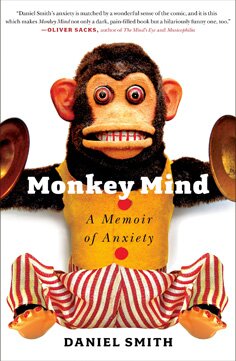Every Friday I publish a new exchange with my mother, Marilyn Smith — psychotherapist, anxiety expert, and genetic wellspring of my neuroses — about anxiety, anxiety disorders, and anxiety treatments.
The series “Ask Dan’s Mom” will soon be opened to questions from readers. If you have a question about anxiety you’d like me to share with my mother, please email me at [email protected].
Part 1 of “Ask Dan’s Mom” here. Part 2 here. Part 3 here. Part 4 here.
Hey Mom. I was planning to continue our conversation about therapeutic breathing techniques — I was supposed to practice Step Two before we moved on to Step Three — but to be honest I’m not prepared. It’s been a lousy week. A lot of anxiety. A lot of tension and thoughts of things falling apart and anxiety-induced fatigue. I hate when this happens, and probably I should have been especially dedicated to the breathing this week. But it never seems to work that way. The more anxious I get, the more despairing I get, and the more despairing I get the less motivated I am to work on my anxiety. Probably this is something you hear a lot from your patients.
Dan, my gut Jewish mother reaction is to make a big pot of chicken soup and drive it over to your place. (Nurturing the mind and body are not bad ways to handle a lousy week.) Know that it’s not unusual to experience difficulty doing the breathing exercises when you’re first starting to learn the techniques and feeling especially anxious. Until the deep breathing becomes automatic it takes a lot of energy to bring your conscious attention to the breath — which is why it’s best to practice when you’re feeling most relaxed, in the early morning or late evening. Don’t give up on it! It’s so worth the effort and the few minutes of your time. Try making it part of your daily routine, like brushing your teeth. In the meantime, do you want some chicken soup?
Thanks, Mom. I would actually love some chicken soup. But if you made some and drove all the way to Brooklyn I suspect it’d just make me feel worse: there’s something about being a grown man being comforted by his mommy that feels … weak, I guess. Like I’d be indulging the self-doubt and sense of powerlessness that the anxiety creates. Like I’d be giving in. Silly? Anyway, I just can’t get myself to do the breathing! You know what I can get myself to do when I’m really anxious? It’s a short and pretty pathetic list: eat crappy food, surf the internet, stare at the wall, and quietly beat myself up… I’m sorry. I shouldn’t be laying this on you. But I figure, you’re an expert, right? You have a better idea than most people about how a person can jolt himself out of these kinds of nervous patterns.
Silly? No, it makes total sense that my bringing over chicken soup would make you feel worse. (But it would have made me feel better!) Having severe anxiety often creates a feeling of helplessness, of not having any control. Which is why the diaphragmatic breathing is so important. It’s something that is concrete, beneficial, and in your control. Like many people you want immediate relief—thus the junk food and web-surfing. And then you beat yourself up for being self-defeating … So I guess your shtick doesn’t work for you. Then why not give the breathing a chance? Maybe you don’t believe it’s worth the effort. Is that it?
You know, maybe I don’t truly believe it’s worth the effort. I mean, I believe it when I stop and think logically. Scott [my oldest brother] says it works. You say it work. I’ve read books that say it works. But when I’m anxious I’m not sure I believe that anything will work, except maybe a lobotomy or a brain transplant. It’s not just the fight-or-flight desperation, though that’s certainly there. It’s also the … the despair, I guess. It’s like a coin that keeps flipping: the anxiety makes me exhausted and depressed, which makes me more anxious, which makes me exhausted and depressed, and so on and so on. When the pattern is in effect, it can be very hard to stop and do something useful.
So you do believe the breathing works when you’re thinking logically? And are there times during the day when your anxiety settles down: windows of opportunity, brief moments to take that breath and slow down your thoughts? It doesn’t have to be at a prescribed time of day, you know. Do it when you’re reading, when you’re walking to the subway, when you’re playing with my granddaughter. At this point it doesn’t really matter when. Just find what works for you and to try to do it. Try to catch that moment and breathe. Dan, you can stop the vicious spinning-out-of-control anxiety by breaking into it and changing its path. (Incidentally, and to make clear to your readers that I’m a responsible therapist, if you were a real patient I probably would’ve referred you to be evaluated for meds by now — if you weren’t already taking them.)
I know, I know. You’re right, of course. It’s just the anxiety talking, saying “Dan, it’s not worth it. Things are already RUINED! You’ve ruined everything!” Do I believe the breathing works when I’m thinking logically? Theoretically, I do. But for me there have only been two things in this world that have been so obviously and unignorably helpful that I know in my bones they work, and that’s pretty strict cognitive therapy and Zen meditation. Everything else that you’ve preached over the years, particularly vigorous exercise and diaphragmatic breathing, haven’t helped as dramatically. So I suppose I do remain a bit skeptical. I’ve got my things — in sixteen years of chronic anxiety I’ve found what works for me — and I find myself sort of reluctant to strike out toward something new.
OK, so don’t try something new. Let’s assume therapeutic breathing doesn’t work for Mr. Monkey Mind, but Zen meditation and cognitive therapy do. That’s fine. But are you meditating and working on the cognitions? There’s nothing wrong with doing what has worked in the past … if you do it. What’s important is that you break into the vortex of anxiety and stop the action dead in its tracks. If you have techniques that work for you, then what’s the problem? Just do it! I hope I’m not being too tough on you, Dan. It’s just that I never said diaphragmatic breathing is the only way to get better. It’s a tool, a great one for many people, but obviously not for everyone. “Whatever works” happens to be a pretty good rule of thumb here.







Sorry you’ve been having such a rough week, Dan – snap – my week has mad monkey mind paw prints all over it too. I went to a meditation class today (after having taken an Ativan, which may well be cheating), and spent the whole time (well, the time when I wasn’t sleeping) freaking out about all the focus on breathing, and wanting it to be over so I could get the hell out of there.
I do really believe that us monkeyminders (not the ones who look after the monkeys – the ones who have monkey minds…) have real difficulty in sitting still and breathing quietly. All the focus on the breathing makes us paranoid about how shallow/laboured/tight/awkward ours is, and the fight to control it ends up feeling a little like another struggle between controlling something and letting it go.
It’s hard to articulate, but all I know is that I tend to feel more anxious in situations where I’m doing helpful things to get me to relax. Which is annoying!
Love your website, Dan! Just gave it a shout-out in my blog: cognitivebehavioralstrategies.com/blog/index.php/2012/02/anxiety-telling-it-like-it-is/
Your mom gives good general advice, but with all due respect, I know from experience that diaphragmatic breathing isn’t the right technique for lots of anxious people and clearly doesn’t seem to be useful for you. I used to teach it all the time to my patients; now, not so much. Why? Because for a lot of people, it seems to backfire. Take panic attacks, for instance. If you’re in the throes of a panic attack and try to breathe it away, you’re likely to get more anxious if it’s “not working” –which, for most folks, means getting rid of the anxiety.
So I find it more helpful–and much research supports this approach–to do “interoceptive exposure” instead. This technique involves inducing the physical symptoms of panic (dizziness, hyperventilation, tunnel vision, etc.) to learn to deal with them. The feelings are yucky, but they pass. By doing the exposure exercises, you can learn to separate the sensations of anxiety from the negative thoughts (“This isn’t working!” “I can’t take this!” ), which amplify the distress. In this way, you eliminate one of the most common core worries: the fear of fear.